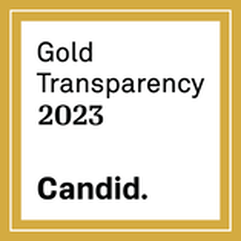|
Pivotal points. We all have quite a few in our lifetime. I personally had a few over the last year alone. But if I’m asked to pick the “one” most significant pivotal point in my 52 years of life, that's easy. It was September 7, 2018. What happened that day? I had the courage to walk into The Center for Sexuality and Gender Diversity. That’s all...I just walked in. I’m a 52 y/o cis-gender gay man. Today, I’m out and I’m proud. But it was not always that way. As many in my generation, we grew up not understanding who we are. I had little knowledge what a gay person was. As a child, I was odd and lonely - a nerd, I must add. The last thing I needed was something else to make me even more different. I wanted to be like the other boys, have popular friends, have a girlfriend, etc. Deep inside I knew who I was, but it was not too hard to suppress it, not to think about it. Then destiny put me in front of the woman that I would marry. We had a lot in common: we were looking for companionship, for love and to start a family. So after less than a month of dating, we got engaged and in about 8 months later, we were married. We had a really good life. And we had 2 amazing children - both in college now, both on a path for successful careers. I can’t complain about what we had. Life was good. And even now, I can definitely say I have no regrets in my choices. But there was a part of me that was not whole, not happy, not quite right. I dedicated my life to my kids; they were (and to a point, still are) my purpose. So when their time came to leave for college, the all too famous empty nest happened. And I found myself lacking something. It’s no coincidence that at that moment, I became honest with myself. Yep, I am gay. But I thought: I have a great life. My wife is a great person that does not deserve the pain I would cause her. Still, I had to tell someone. And I did. My daughter that is my “buddy “ was the first, then I told others. I was naive enough to think that if I just told a few close people, that would be enough and then I could go back to my closet. By the way, every person I told has been nothing but supportive and loving, so I’m blessed. But even their love and support, it turned out, was not enough. I realized once I came out to some, something inside of me started screaming that I needed to be me, I needed to be authentic. So I decided to contact The Center, and got an amazing and supportive response immediately. Then I decided, on September 7, to walk in. I remember telling the volunteer that I first met that I did not know what I was doing there. I really didn’t. I think this was my way of openly expressing myself, who I was, to a group of people, all strangers. And I was a little nervous. But that day I felt comfortable and very supported by the really cool people gathering there. Something I was not expecting. I knew I belonged (yes, I am quoting the website). But I still thought I could never be able to fully come out. I could not fathom how I could do that. I had a great life, great kids and a really good relationship with my wife. She is a wonderful human being and a friend. And the rest of my family and friends - how could I tell them? But with the support from The Center, the network of new friends I made (by the way, fantastic people) and the counseling I received through The Center itself, I worked things out and I figured out my life. And then, I was ready. On Martin Luther King Jr. Day, January 21, 2019, I had another pivotal point. That day I fully came out, no more hiding, no more pretending. I started calling and texting people close to me. It was still a very emotional time for me. I was leaving my old life, not an authentic one - but still, the person I portrayed to the world, the one I was used to being, my safety net, was just gone. But at the end of the day, I was me, I was happy, and I was whole. A big weight was all gone. Yet I know, the road ahead will still be hard and painful at times. I am still working out things in my personal life. And that part has to stay private and personal. But the love and support I have received has been amazing. I am so grateful and I am dedicated to The Center, their ideals and mission. I am trying to be an active part of the LGBTQ community and to do whatever is in my power to help, to advocate. I found my new purpose, here in Bakersfield. My old life feels so far away, even if my journey is new. I am still me but now I am the whole, real me. And, as others I am sure can relate, it is an amazing feeling. My life has changed. And I owe it mostly to this place with the colorful flags in front, right here on 18th Street. I have a debt to The Center that I plan to pay forward by service to our Community. My life has reached a pivotal point, and will never be the same. And for that I am forever grateful. about the author: Jaime L. Ortiz 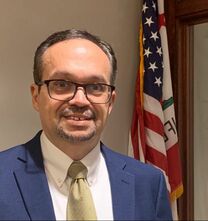 Jaime L. Ortiz was born and raised in Puerto Rico. After finishing medical school on the Island, he moved for training to Canton, Ohio and then to New York City. As a practicing psychiatrist, he worked with children and adults, in mostly indigent city and rural areas. He practiced for a few years in West Virginia and finally in Bakersfield for about 15 years, where he currently is working for the Department of Corrections and Rehabilitation.
0 Comments
I was fortunate to attend the “Mad River and the History of LGBTQ Teachers' Rights” presentation by Dr. Margaret A. Nash from UC Riverside held at CSUB on March 21st. While I admit that I was pretty naïve to this topic, I was eager to learn - especially since my wife is both a teacher and part of the LGBTQ community. Dr. Nash begins by detailing an unjust case in 1974 about a guidance counsellor, Marj Rowland, from Mad River, Ohio, who fought for her civil rights against discrimination based on her sexual orientation. This story really stood out because it is significant to note that while she won her initial case against discrimination, she was faced with backlash in the form of retaliation by the school district. The backlash Rowland endured was unwarranted, and it included: no student contact, denial of her employment contract renewal, being blacklisted within different schools in Ohio and even being charged with felonies and misdemeanours. The most gruelling part was that Rowland’s series of legal battles totalled over a decade long, as there was no sense of urgency for her case, since sexual orientation was not yet constitutionally protected. Even though Rowland’s resilience throughout the fight for her rights is commendable and inspiring, it is hard to ignore how blatant her freedom of speech and civil rights were unacceptably violated. Although there are currently Equality Acts in place to serve and protect LGBTQ individuals in the workforce, it still makes one wonder how far along we truly are today in comparison to Rowland’s case. While the anti-discrimination laws that presently exist for LGBTQ teachers are vital, there still seems to be a lingering fear for teachers to openly come out in public. So the question remains: how do we continue to help protect teachers and students alike, to avoid the backlash and mental agony of what Rowland had to endure? Current and future educators who were in attendance suggested that it starts with creating a safe and inclusive environment in schools. Not only do we need to vocalize the intolerance of discriminatory behaviours, but we must also show our support tangibly. We can show support by putting up rainbow stickers in classrooms, making positive affirmation posters, celebrating LGBTQ milestones like National Coming Out day, and creating school clubs that promote love and support for everyone inclusively - just to name a few examples. These practices should be implemented habitually, in hope that safe environments eventually become a social norm for the well-being of our future generations. If you or someone you know need assistance with creating a safe environment in schools or in other workplaces, there are plenty of resources available. CSUB and BC have continually improved their school climates by providing visible support for all LGBTQ faculty and students. The Center of Sexuality & Diversity itself has been created as a safe haven for the LGBTQ community and it offers multiple support groups and services. Moreover, the Center actively provides a range of resources to local business allies in order to promote workplace equality. Specifically, abOUT Kern was formed to strengthen our community by hosting professional networking events for LGBTQ people and their allies. To increase awareness of LGBTQ issues in the workplace, Chevron and The Center have teamed up for an evening of networking and to share best practices around LGBTA (the A here is for "ally") workplace equality and community. This free event is for Kern County professionals and members of the business community. The next abOUT Kern event will take place on Thursday April 4th at 5pm – 7pm, located at CSUB's Stockdale room. For more information, please contact the Center at [email protected] or refer to the Center’s Calendar. about the authorR. Velasco is a Canadian writer new to Bakersfield. She is actively seeking ways to raise community consciousness about LGBTQ issues and topics, one blog post at a time. She is also part of The Center’s Women Support Group.
The Center for Sexuality & Gender Diversity (The Center) is pleased to release its first annual Impact Statement of services provided to the community. “The Center provides services to support Kern County LGBTQ+ residents in living happy, productive, fulfilling lives in a safe and supportive community,” said Executive Director Jan Hefner. “Our efforts are focused on individual support services such as counseling and activities to help build self-esteem, and community transformation activities including cultural competency trainings. By conservative estimates, 43,000 Kern residents identify as LGBTQ+; many have struggled for self-acceptance as well as acceptance and understanding from family, friends, and community. The Center provides that acceptance and educates the wider community in how to provide affirming services.” The highlights in the Impact Statement include 552 private counseling sessions provided and 819 persons receiving Cultural Competency Trainings during the year. Trainings were provided to a variety of organizations and businesses, including the Bakersfield Police Department, Kern County Network for Children, Bakersfield Homeless Center, Kern Behavioral Health & Recovery Services, and more. In mid-November, The Center also launched direct services in ten Kern communities outside of Bakersfield, including Ridgecrest, Kern River Valley, and Taft. “If a picture is worth a thousand words, so is a quantifier of community impact,” adds Board President Louis Medina. “The Center’s Community Impact Sheet for 2018 features many such quantifiers that hopefully will paint a picture of the BIG impact The Center made in the lives of many people in the local LGBTQ+ community and its allies last year, as well as among our nonprofit partners who are now more culturally competent on LGBTQ+ issues and needs. This data excites us because thanks to staff growth and increased board and volunteer engagement, we are hopeful that The Center's community impact will just continue to go from strength to strength." Comments received across programs affirm that The Center’s services are improving client lives:
The Center’s programs and services receive major funding from California Reducing Disparities Project, The California Endowment, Kaiser Permanente Kern County and other funders, as well as corporate and personal donations. For more information on receiving services or supporting The Center’s work, call 661-404-5209. Media Contact:
Executive Director Jan Hefner talks about her personal journey that brought her to be a member of The Center’s core leadership: acting, theater, advertising, AIDs activism and community health work. Born and raised in Bakersfield, Hefner gives us a glimpse into what she finds challenging and rewarding about working as an LGBTQ advocate here in Kern County. *** Do you face specific challenges as a member of the LGBTQ community in this particular area, the Central Valley? It's interesting. I was born here, and except for the two years I lived in LA, I've lived here all of my life. I've never felt the need to flee Bakersfield as a place, but I acknowledge there are a lot of people who really have struggled being here. I'm not sure why I never felt the need to flee, but really attribute it a lot to the community I found through theater because there were a lot of LGBTQ people in theater. Were you out in your daily life? I had not considered myself closeted, but I also didn't talk about "those things that we're not supposed to talk about." And I was partnered during almost all of my time when I worked at the newspaper, and I talked about my partners but not in a partner kind of way. You know, roommates or friends or whatever. But there were several people that I became friends with, and of course they knew, and we talked about it openly. When I got involved in the Center, before I was hired here, I was a spokesperson for the news, because of my marketing background. I distinctly remember standing on the corner outside my office over on the corner behind the hospital, with the news crew who wanted to shoot it outside because of the light. I was doing something about transgender rights. I'd done lots of TV, I'd done commercials and all that. But I remember my stomach just flopping over, because it was the first time that I was going to be on TV advocating for the LGBTQ community. And it just made me incredibly nervous. But it's like anything else, because you go through and you think, "OK, that was okay, nothing broke" - and then you do it some more. And now we're doing these TV spots that are out there, and it's going to be interesting to see what kind of response there is to those. [Click "Read More" below to read the full interview with Jan Hefner.] By Jose M Granados Public opinion and support for LGBTQ rights have tipped to the positive side, even in Bakersfield and Kern County. The latest surveys and polls show that nearly half of Americans and 64% of those who identify as LGBT allies say they are more likely to spend money with businesses that are LGBT inclusive – see “Being LGBT Inclusive Is Good for Business, Survey Finds” on Fortune.com and “Why Many Businesses Are Becoming More Vocal In Support of LGBTQ Rights” on hbr.org. Clearly, welcoming all customers, including LGBTQ and their allies, can have a wide range of economic impacts for your business, the city and the community - from recruiting educated and talented employees to the ability for the city to attract corporate investment, tourism, conventions and major events. In a 2016 poll, nearly 50% of American meeting planners said they would avoid planning events in places that pass anti-LGBTQ legislation. Since then, several business coalitions have popped up around the nation making the economic case for nondiscrimination, inclusion and diversity. As the general support for LGBTQ grows, so does the economic incentives for companies to position themselves in sync with that growing sentiment. Embracing inclusion and diversity is not just ethically and morally right, it is also good for business. Being LGBTQ-friendly makes your company more profitable. Is your company ready to create an inclusive environment for your team and customers? Is your business ready to tap the growing LGBTQ market? If you are, great! If you are not, help is here. Reach out to The Center for Sexually & Gender Diversity and they will walk you through the process of how to become an LGBTQ friendly business and how to tap into the growing LGBTQ market segments. Either way, you should attend the next abOUT Kern business mixer, a professional networking event for LGBTQ+ people and allies. The event is Thursday, April 4, 2019 5pm – 7pm, at California State University, Bakersfield, Stockdale Room, 9001 Stockdale Hwy, Bakersfield, CA 93311 – download the flyer below for details. The event is free and open to everyone. Note: LGBTQ stands for Lesbian, Gay, bisexual, Transgender and Queer/Questioning
Jose M Granadosis a longtime member of the Bakersfield community and a member of the Board of Directors at The Center for Sexually & Gender Diversity. He can be reached at [email protected]. As you know, sexual orientation and gender identity are not asked in many national surveys – including the Census – which can make it difficult to advocate for the resources that our communities need to thrive. Our programs and advocacy work is stronger when we are all counted.
That’s why we’re excited to share the #Out4MentalHealth Community Survey with you. This survey is designed to capture the lived experiences of diverse LGBTQ Californians, and the factors affecting our health and wellbeing. The results of the #Out4MentalHealth Community Survey will better direct statewide and local advocacy efforts for programs, resources, and policy changes that will meet the needs of our communities. Please take the time to take the survey and share with others who would be interested. Our social media toolkit provides sample graphics, Facebook, and Twitter posts, as well as a sample email and flyer you can display at your work or anywhere LGBTQ people gather locally. Everyone ages 18 and up who completes the survey will have a chance to win a gift card worth up to $50. The first 500 youth ages 17 or under to take the survey can claim a $5 gift card. Share your experiences and make sure your voice is counted in the #Out4MentalHealth Community Survey! Jerry’s Pizza sounds like a name for a common pizza place, right? However, this establishment, which is located in downtown Bakersfield, happens to be a popular venue for fun social events and local music shows. With Bakersfield being a small city, Jerry’s Pizza provides some form of entertainment for the younger generations and people belonging to different scenes, whether you’re heavily involved or you’re just there to see what these shows have to offer. When I first started attending these shows, I was fairly new to everything and to this day I still feel like I am. I never would have expected to have spent the past two years going to shows during my free time and supporting local bands. I never imagined that someday, I’d be interviewing some of these bands and writing about it. This past January, I had the pleasure to interview With Liberty, one of the opening bands performing with Aggravated Friction, Defected Drones, Hybrid Saints, and The Afraid for their West Coast Winter Warriors Tour. Both official members and brothers, Marco and Joey, were kind enough to provide me with insight on what it's like to be on tour and their history as a band (and also gave me a free gift of some of their merch)! Q&A With the BandSo tell me your band name and where you’re from. Joey: We’re With Liberty. I’m Joey and I play bass and do vocals for the band. Marco: I’m Marco, or M6, and I play guitar and also do vocals for the band. We’re from Panorama City, or from the LA area. What genre would you consider yourselves to be? Joey: Our genre would be somewhere along the lines of melodic hardcore, with some elements of thrash, punk rock, and heavy metal. Can you tell me a bit more about With Liberty ? Marco: With Liberty is a band which tends to have heavy punk influences which can often lead to political themes, but our music isn’t overly political. We also see ourselves as huge Metallica fans. Who are your biggest influences? Marco: We’re influenced by bands like NOFX, Bad Religion.. Joey: And also by Rebel Spell and Metallica. Are you currently signed to a record label? Joey: We’re not currently signed to any record label, but we are looking and hoping to be signed soon. What are some of the craziest events that have happened to you while on tour/performing? Marco: So, during one of our tours, we almost hit a cow. Joey: The cow was standing in the middle of the road and wouldn’t move either. It was as if it was really comfortable being on the road. Are you two a member of other bands or organizations? Joey: We used to be in a metal band, but now we’re just involved in With Liberty. Can you tell me more about your instruments? Do they have any form of personalized modifications? Joey: Marco actually customized his guitar so that it has color changing LED lights. Marco: Not only does my guitar change colors, but my amp also does too. How has the tour gone for you guys so far? Joey: Well, so far, it’s been pretty good. It’s our first time to ever perform in Bakersfield so that’s a new experience we’ve got. What other venues have you guys performed in and where else do you hope to be able to perform? Joey: We’ve mainly performed out in LA in venues such as the Lexington, Watts Cave, and Pop Studios. Our main goal is to perform in one of the many House of Blues. Can you briefly explain the songwriting process? Joey: When it comes to us writing songs, we both work on one song. I’ll come up with one part, he’ll come up with another, we’ll look into both parts and make them into one song. It’s almost like putting together a puzzle. *** After my brief interview with the band, I decided to stick around with some of my good friends and watched them perform their set. Seeing a band perform has always been fun for me, but watching them perform with a lot of enthusiasm like I saw that night was honestly the best experience for me.
Even though I was somewhat unprepared for this interview, I genuinely had a lot of fun being a part of it and I hope to be able to interview and watch them perform again soon. Check out the band... SoundCloud - https://soundcloud.com/withlibertyband BandCamp - https://withlibertyband.bandcamp.com/ Instagram - @withlibertyband Facebook - https://www.facebook.com/WithLibertyBand/ About The Author: Monica Chairez Monica Chairez is a twenty-year-old college student currently attending CSUB as a psychology major. Her preferred pronouns are she/her/hers and she currently works on interviewing bands and spreading the word on the local music scene. Lou Medina, President of the Board of Directors of The Center for Sexuality & Gender Diversity, is a former staff writer for The Bakersfield Californian and an award-winning writer of fiction and non-fiction stories and short plays. His story, “Cub” which we feature in this month’s issue of The Center’s e-newsletter, was inspired by a Center event Lou attended in 2015: the screening at one of our movie nights, of a Spanish-language documentary film called “El Canto del Colibrí” (in English, “The Song of the Hummingbird”), about Hispanic dads who are supportive of their trans children’s coming into the fulness of their gender identity. “Cub” won Third Prize in the Writers of Kern (WOK) Fall Writing Contest that year and is featured in an anthology WOK published in late 2018. We present it here in celebration of and solidarity with our local trans community and International Transgender Day of Visibility, which is observed on March 31. Lou, who is gay, lives in Bakersfield with his two male cats, Rescue and Groom. “Cub”: A Short, Fictional Story of a Parent’s Loving Affirmation of Their Trans Child |
|||||||||||||
The Center for Sexuality & Gender Diversity (The Center) is a Community-Based Organization and 501(c)(3) nonprofit organization serving the 2SLGBTQIA+ community in Kern County.
Receive Monthly UpdatesWe have so many exciting things going on, be the first to find out!
|
Helpful Links |
Get Involved |
Contact Us |
Certified as Financially Sound and TransparentEIN: 45-3709449
|
|
© The Center for Sexuality & Gender Diversity 2018
|
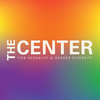

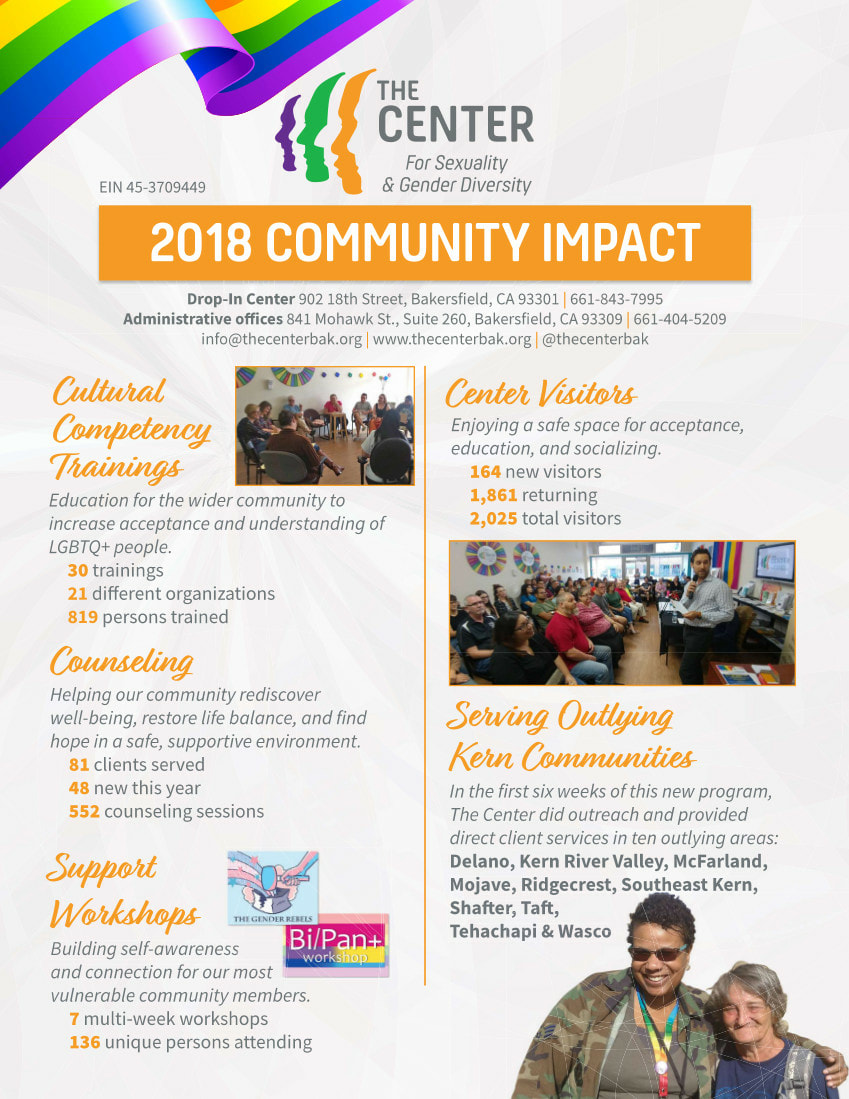
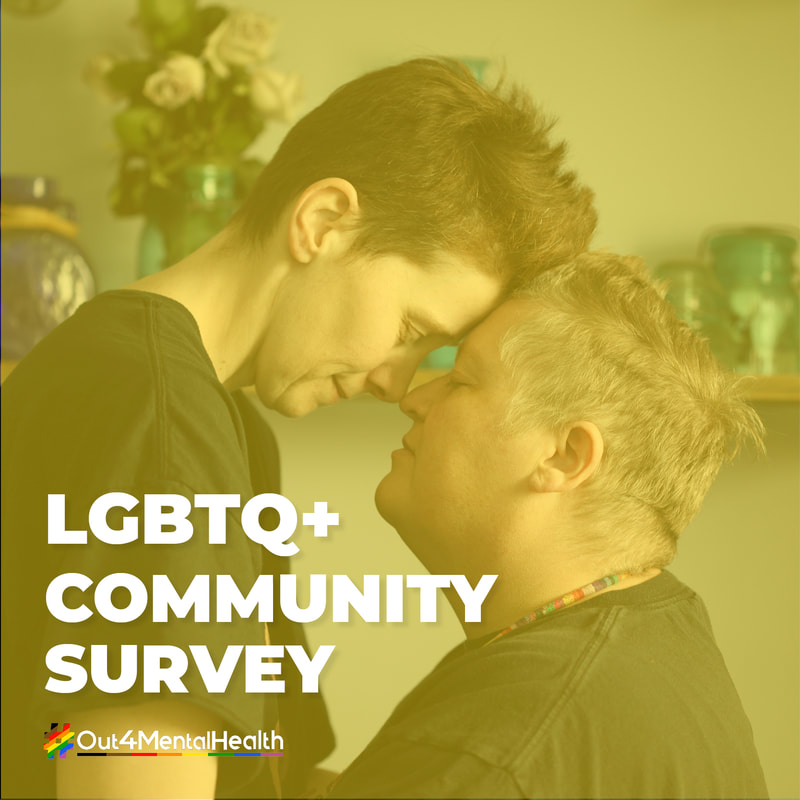

 RSS Feed
RSS Feed


